
by Pigeon Patrol | Feb 16, 2022 | Bird Spike, Pigeon Spikes, Pigeons, Pigeons in the News, Raccoons, Sparrows
Be patient with a family of pigeons
If the babies have already hatched, really the only thing you can do is wait for them to grow up and fly away. Don’t worry — baby pigeons grow up very quickly! The time between when they hatch from the egg to when they fly away from their nest is usually less than 4 weeks. Once they leave, the babies don’t come back to the nest again.
The parents may try to start another nest in the same spot, even before the first babies have grown up and flown off. Read on to find out how to keep them from nesting on your balcony in the future.
Can’t I just move the nest?
No. Pigeons are very location-specific when it comes to their nest site. Moving the nest over even a few feet — say to a neighbouring balcony — can cause the parents to abandon the nest.
Baby pigeons NEED their parents — they cannot survive without them. Their parents feed them, keep them warm, and even after they’ve left the nest mom and dad show them how to fly, escape from predators, and integrate with the flock.
If you take the babies off of your balcony and move them, even if it’s to a “nice” spot like the local park, they will die. The best thing to do is to let the parents raise this one set of babies. It will take less than a month, they grow up so fast. Once the babies have flown away, you can prevent the pigeons from nesting again in the future.
Keep things tidy
Clean up or put away any things you might be storing on your balcony that are providing shelter or hiding spots for the pigeons to nest. Sweep away any feces or nesting material. It’s fine to do this cleaning while the babies are still on the balcony, just stay away from the exact spot the nest is in.
Remember, the parent pigeons may lay a new set of eggs before the first babies are grown up and gone. You will have to be diligent and go outside every day to sweep away any fresh nesting material. Eventually, the pigeons will get the message that your balcony is not a good place to nest, and they’ll go elsewhere.
What if they lay another set of eggs?
If they do lay a new set of eggs, provided you know that they were laid less than a week ago, it’s fine to dispose of them. We recommend taking them to the local park and hiding them under a bush – that way they can go back to being a part of nature.
If there is a new set of eggs and you’re not sure when they were laid, or you know they’re over two weeks old, we recommend leaving them be and letting the parents raise that brood. Pigeons usually incubate their eggs for about 3 weeks, and then the babies take about 4 weeks to grow up after hatching.

How to keep pigeons from nesting in the future
There are a few different things you can try to make your balcony less attractive to pigeons looking for a place to nest. Remember to wait until AFTER the babies have grown up and flown away before implementing any of these measures. You don’t want to separate the babies from their parents – they will die without their mom and dad.
Keep things tidy
Keeping things tidy and uncluttered is the first step. Pigeons like to choose a sheltered nest spot, so they like furniture and storage items to hide behind. Going out every day and sweeping off any new nesting material is the best thing you can do to prevent pigeon nests. Even just your presence out on the balcony will be enough to discourage many pigeons from nesting. We usually find that nests are made when no one is using the balcony, either early in the season or when the occupants have been out of town for a while.
Keep pigeons from perching
Adult pigeons like to perch on the railing of their nest-site balcony, so they can look around and spot any nearby predators. If you make it impossible to perch on the railing, they’ll usually find somewhere else to go.
We recommend a single length of wire or heavy gauge fishing line. Secure the line tautly about 2-3 inches above and parallel to the balcony railing. Tying it to nails or screws at either end can work. Pigeons aren’t technically perching birds, so it’s hard for them to stand on a piece of wire so thin. They won’t want to build their nest on a balcony where they can’t look out for predators.
Commercial flexible pigeon coils and wires can also work, but will be more expensive to install. We never recommend the use of sticky deterrents, because they can harm both pigeons and other species of birds.
Scare the pigeons away from the balcony
The best thing to scare pigeons away from a balcony is frequent human presence. We usually find that nests are made when no one is using the balcony, either early in the season or when the occupants have been out of town for a while.
You can also use visual deterrents to keep pigeons away from your balcony. Strips of shiny wrapping paper blowing in the breeze, old CDs hanging from string, and colourful spinning pinwheels are some cheap and easy options. Any visual deterrent will be more effective if you move it around or change it up regularly.
And no, those plastic owls don’t really work. At least not for pigeons.
Be careful with pigeon netting
Completely netting in a balcony or ledge can be a very effective way of keeping pigeons from nesting or roosting in that spot. However, pigeon netting MUST be professionally installed and regularly maintained! When pigeon netting gets loose and floppy, it becomes a danger to pigeons, hawks, sparrows, and any other birds that might fly into it and get tangled up.
It is also important to wait until any active nests are finished and all babies have flown away before installing pigeon netting. If the babies are separated from their parents, they will die.
Pigeon Patrol Products & Services is the leading manufacturer and distributor of bird deterrent (control) products in Canada. Pigeon Patrol products have solved pest bird problems in industrial, commercial, and residential settings since 2000, by using safe and humane bird deterrents with only bird and animal friendly solutions. At Pigeon Patrol, we manufacture and offer a variety of bird deterrents, ranging from Ultra-flex Bird Spikes with UV protection, Bird Netting, 4-S Bird Gel and the best Ultrasonic and audible sound devices on the market today.
Voted Best Canadian wholesaler for Bird Deterrent products ten years in a row.
Contact us at 1- 877– 4– NO-BIRD, (604) 585-9279 or visit our website at www.pigeonpatrol.ca
Pigeon/Pigeon Patrol / Pigeons Roosting / Vancouver Pigeon Control /Bird Spikes / Bird Control / Bird Deterrent / Pigeon Deterrent? Surrey Pigeon Control / Pest /Seagull deterrent / Vancouver Pigeon Blog / Birds Inside Home / Pigeons in the cities / Ice Pigeons/ What to do about pigeons/ sparrows , Damage by Sparrows, How To Keep Raccoons Away, Why Are Raccoons Considered Pests/ De-fence / Pigeon Nesting/ Bird Droppings / Pigeon Dropping/ woodpecker control/ Professional Bird Control Company/ Keep The Birds Away/ Birds/rats/ seagull/pigeon/woodpecker/ dove/sparrow/pidgeon control/pidgeon problem/ pidgeon control/flying rats/ pigeon Problems/ bird netting/bird gel/bird spray/bird nails/ bird guard
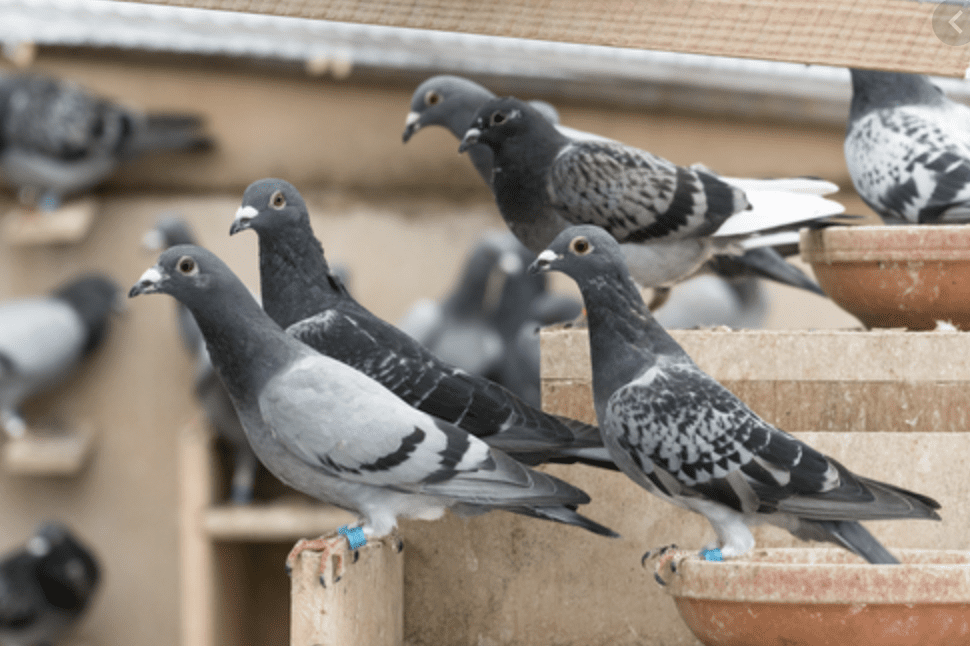
by Pigeon Patrol | Feb 7, 2022 | Pigeon Predators, Pigeon Spikes, Pigeons, Pigeons in the News, Raccoons, Sparrows, UltraSonic Bird Control
A local wildlife organization is concerned about the number of sick pigeons it’s finding in Regina’s downtown.
Megan Lawrence, director of rehabilitation for Salthaven West, said her organization is frequently called for reports of pigeons in distress.
She said Salthaven has been dealing with the birds for years now and fears they might have been poisoned.
“On average we’re seeing a poisoned pigeon every two to three weeks,” she said, adding those numbers increase in the summer. “It’s not a very humane death. Their temperature skyrockets; it can be a very painful death.”
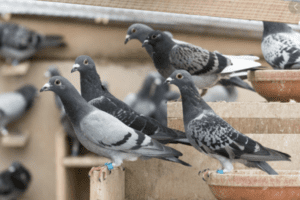
“By the time we receive them, they’re having violent seizures,” she said. “The only thing we can do to get rid of the poison in their system is basically flush it out.”
Lawrence said she’s heard that some businesses downtown may be using poison in order to detract the birds from congregating on rooftops and other roosting points on buildings. However, she wasn’t able to offer any proof for her claims or pinpoint specific businesses and said she hasn’t spoken to any business owners herself.
The Leader-Post contacted some downtown businesses to see how they control the pigeon population. None of the businesses who responded said they use poison or have had an issue with pigeon overpopulation.
Kevin Lang, building manager for the Ramada Plaza located on Victoria Avenue, said while he has inquired with pest control companies about using poison to stop pigeons from roosting on the hotel’s roof, he’s never used it.
“I’ve been told … it affects the other (types of) birds,” he said. “(If) you put poison out, it can be consumed by anything that lands on our roof, which is not environmentally friendly.”
Instead, the hotel uses cages to keep them out. He said without them, pigeons can get into ventilation equipment and leave feathers in the rooftop coils.
Lawrence said if pigeons ingest poison, they aren’t the only ones who suffer. Animals who eat pigeons could be affected.
“If a Peregrine falcon was to eat one of those pigeons that had ingested the poison, the falcon is also going to get the poison and perhaps die as well,” she said.
Half of the pigeons they receive, she said, end up dying.
Salthaven’s most recent call to assist a pigeon was Wednesday evening. That one ended up dying. The organization doesn’t usually have pigeons tested to see what specific poison is making them sick, but it’s considering sending that one in for testing.
Lawrence believes the pigeons may be ingesting Avitrol, a bird control product she said is used in cities across Canada.
“It’s very common … to control pigeon populations this way,” she said. “It’s likely (because) it’s cheap and easy.”
In an email, the City of Regina said it doesn’t have a pigeon control program and doesn’t monitor pigeon populations.
On its website, the makers of Avitrol say the product “causes behaviours similar to an epileptic seizure.”
“Birds eating the treated bait will emit distress signals used by their species when they are frightened or injured,” the website says. “This will frighten the flock and cause it to leave the site.”
Several Regina pest control companies contacted by the Leader-Post said they do offer Avitrol, but it can only be administered in commercial and industrial areas and isn’t for retail sale. A trained pest control employee must administer it.
Instead of poison, Lawrence recommends removing structures where pigeons could roost and screen off air conditioning units where they might drink water from. Bristling wires, which prevent pigeons from landing, can also be purchased from a pest control retailer and installed.
“If they’re up on the roof and you start seeing them build nest, remove all nesting materials,” she said. “The more times that happens they’re going to realize this isn’t a place (they can) nest.”
Source
Pigeon Patrol Products & Services is the leading manufacturer and distributor of bird deterrent (control) products in Canada. Pigeon Patrol products have solved pest bird problems in industrial, commercial, and residential settings since 2000, by using safe and humane bird deterrents with only bird and animal friendly solutions. At Pigeon Patrol, we manufacture and offer a variety of bird deterrents, ranging from Ultra-flex Bird Spikes with UV protection, Bird Netting, 4-S Bird Gel and the best Ultrasonic and audible sound devices on the market today.
Voted Best Canadian wholesaler for Bird Deterrent products ten years in a row.
Contact us at 1- 877– 4– NO-BIRD, (604) 585-9279 or visit our website at www.pigeonpatrol.ca
Pigeon/Pigeon Patrol / Pigeons Roosting / Vancouver Pigeon Control /Bird Spikes / Bird Control / Bird Deterrent / Pigeon Deterrent? Surrey Pigeon Control / Pest /Seagull deterrent / Vancouver Pigeon Blog / Birds Inside Home / Pigeons in the cities / Ice Pigeons/ What to do about pigeons/ sparrows , Damage by Sparrows, How To Keep Raccoons Away, Why Are Raccoons Considered Pests/ De-fence / Pigeon Nesting/ Bird Droppings / Pigeon Dropping/ woodpecker control/ Professional Bird Control Company/ Keep The Birds Away/ Birds/rats/ seagull/pigeon/woodpecker/ dove/sparrow/pidgeon control/pidgeon problem/ pidgeon control/flying rats/ pigeon Problems/ bird netting/bird gel/bird spray/bird nails/ bird guard
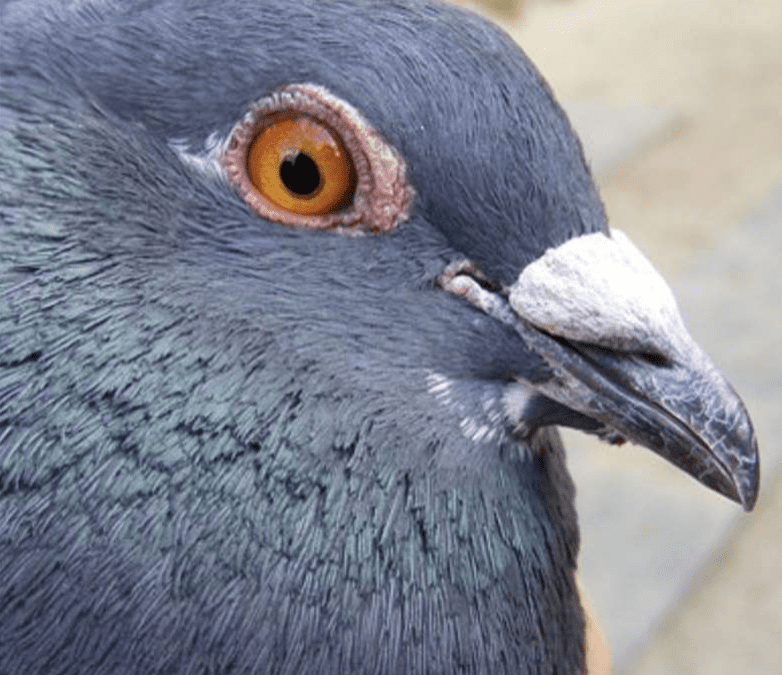
by Pigeon Patrol | Feb 7, 2022 | Bird Spike, Pigeon Predators, Pigeon Spikes, Pigeons, Pigeons in the News, Raccoons, Sparrows
Where do you go for your daily headlines? Your stock prices? Certainly not your neighborhood pigeons. Thomson Reuters, also known as The Answer Company, is the world’s largest provider of news and information to businesses and professionals. As early as the 1850s, they were sending news of bond prices across the English Channel on carrier pigeons.
Thomson Reuters, also known as The Answer Company, is the world’s largest provider of news and information to businesses and professionals. As early as the 1850s, they were sending news of bond prices across the English Channel on carrier pigeons.
Lincoln’s assassination was first reported into Europe by Baron Reuter, and he did it by sending fishing ships out to catch the steamers as they were coming across the Atlantic and getting back first. So being first, and being fast is paramount to Thomson Reuters, and it has been since day one.
Though much has changed and evolved since the days of its first office in the city of London where they transmitted share price quotes to Paris via the new Dover-Calais telegraph cable, what hasn’t changed is the responsibility to supply mission-critical news to businesses around the world.
With the rapid rise in digital advancements, what has changed, is the vast amount of information to manage. Professionals are consuming the news via mobile apps on various devices, portfolio management is influenced by headlines, and machines can be programmed to perform trades based upon market fluctuations. Getting it first is vitally important in the news business. Thomson Reuters leans on speed to meet the needs of today’s digital customers. Rapidity and accuracy is a duty its customers count upon them to fulfill; a duty they take seriously.
News Travels Fast
Using SAP HANA, they’ve been able to double the speed at which they can ingest polling data and get more than a tenfold increase in the way they analyze that data. Running live on SAP allows them to do what used to take days, and do it almost instantaneously.
A good example of this is the Polling Explorer. As you can imagine, the use of the polling explorer was widespread during the 2016 pre-elections. Today, Thomson Reuters’ polling data is easily interrogated. Back in the early eighties however, polling data meant a big book of data that landed on your desk with a thud, and this would be only the highlight results. If you really wanted to analyze that data, you would have to ask for cross-tabs to be created. It would take hours, if not days, to analyze what-ifs. With today’s level of data interactivity, running SAP HANA means getting a live data experience.
Source
Pigeon Patrol Products & Services is the leading manufacturer and distributor of bird deterrent (control) products in Canada. Pigeon Patrol products have solved pest bird problems in industrial, commercial, and residential settings since 2000, by using safe and humane bird deterrents with only bird and animal friendly solutions. At Pigeon Patrol, we manufacture and offer a variety of bird deterrents, ranging from Ultra-flex Bird Spikes with UV protection, Bird Netting, 4-S Bird Gel and the best Ultrasonic and audible sound devices on the market today.
Voted Best Canadian wholesaler for Bird Deterrent products ten years in a row.
Contact us at 1- 877– 4– NO-BIRD, (604) 585-9279 or visit our website at www.pigeonpatrol.ca
Pigeon/Pigeon Patrol / Pigeons Roosting / Vancouver Pigeon Control /Bird Spikes / Bird Control / Bird Deterrent / Pigeon Deterrent? Surrey Pigeon Control / Pest /Seagull deterrent / Vancouver Pigeon Blog / Birds Inside Home / Pigeons in the cities / Ice Pigeons/ What to do about pigeons/ sparrows , Damage by Sparrows, How To Keep Raccoons Away, Why Are Raccoons Considered Pests/ De-fence / Pigeon Nesting/ Bird Droppings / Pigeon Dropping/ woodpecker control/ Professional Bird Control Company/ Keep The Birds Away/ Birds/rats/ seagull/pigeon/woodpecker/ dove/sparrow/pidgeon control/pidgeon problem/ pidgeon control/flying rats/ pigeon Problems/ bird netting/bird gel/bird spray/bird nails/ bird guard
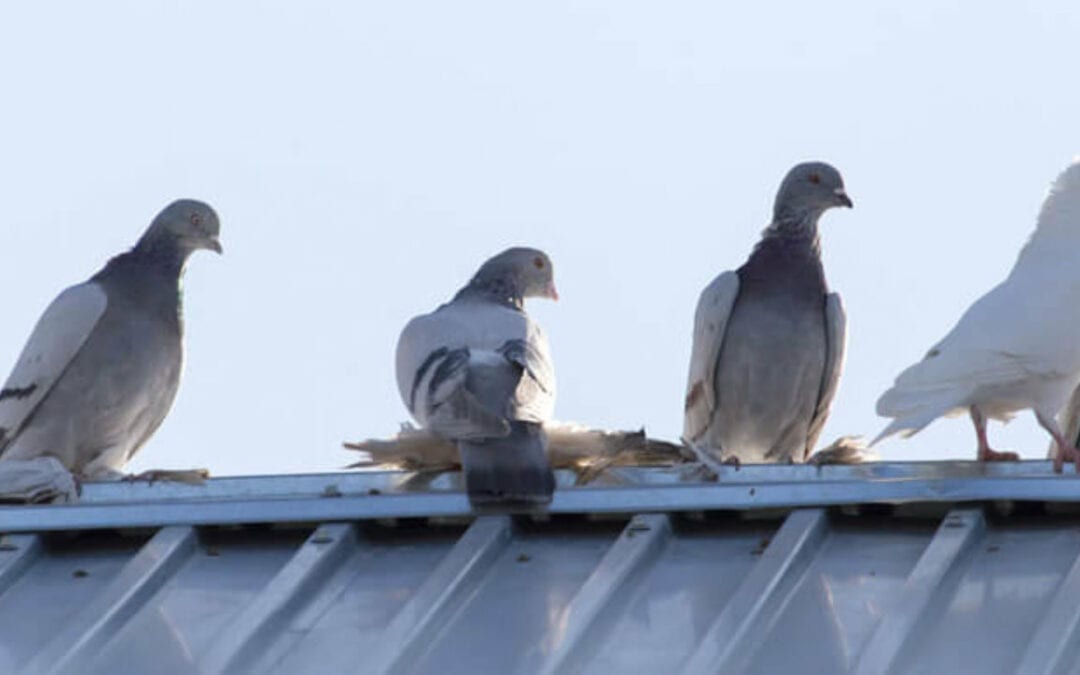
by Pigeon Patrol | Feb 7, 2022 | Pigeon Spikes, Pigeons, Pigeons in the News, Raccoons, Sparrows, UltraSonic Bird Control
A Toronto resident recorded a video of a man snatching pigeons in the city’s east end and when she tried to report it to officials, she said no one wanted to investigate.
On Sunday morning, Bruna Doberstein was on her way home when she witnessed a man and a child capturing the birds with a net and placing them inside a crowded cage in a parking lot at Lawrence Avenue East and Markham Road. That’s when she decided to take out her phone and start recording.
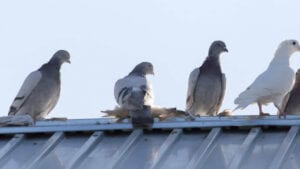
“I expected he would stop doing it after he saw that I was recording. But he didn’t. He seemed pretty comfortable doing it,” Doberstein told CityNews.
In the video, you can hear Doberstein asking the man why he was trapping the pigeons and that he “can’t do this,” in which he responds “Yes I can. I take them to my farm and I raise them.”
Doberstein said she didn’t buy it.
“He wasn’t being gentle. He was holding the birds by their wings. A person who would raise the birds would be at least careful and keep them safe” she said. “I don’t know the story but I know it’s not good.”
At that moment, Doberstein decided to call the police. She said that while the officer was courteous, she was told that it wasn’t their jurisdiction and they wouldn’t be sending an officer.
Instead they told her to call 311. But she said from past experience, Doberstein didn’t think they would be of any help in this matter.
This wasn’t the first time she witnessed the man capturing a cage full of birds and it also wasn’t the first time she tried reporting on what she witnessed.
“It was the second time I saw this guy. I recognized the truck from almost a year ago in August in the same parking lot.”
She told CityNews that last year she contacted a variety of different municipal and provincial departments with no luck, “I called PAWS (Provincial Animal Welfares services) and The Ministry of Nature and Forestry too and I never heard back.”
This kind of response isn’t unusual, according to Camille Labchuck, animal rights lawyer and executive director of Animal Justice.
“In my experience this is not uncommon when it comes to animal issues and law enforcement agencies,” said Labchuck. “Because a lot of people have authority also means that nobody does, leading to nobody wanting to pick it up and run with it.”
While Labchuck and her team are disappointed that Toronto Animal Services and police didn’t do more, they ultimately had more success with reporting the incident to Provincial Animal Welfare Services and the Ministry of Natural Resources and Forestry.
“PAWS is the agency that took over enforcement from the OSPCA two years back. They are tasked with investigating any animal cruelty problems.” Labchuck explained. Something many people may not be aware of.
Since the OSPCA announced in 2019 it will no longer enforce animal cruelty laws, there has been no clear guidance of who one should contact to report, investigate and enforce animal cruelty laws.
“You got a man roughly handling birds by the wings which is not permitted,” Labchuck said. “To say nothing of the fact that he shouldn’t be interacting with pigeons anyways. They are protected species under the federal Migratory Bird Convention Act”.
The Ministry of Natural Resources and Forestry are in charge of enforcing the wildlife act. Labchuck said there could be a clear violation here as residents can’t interact with native wildlife without a permit.
However, while both departments took down information, neither would accept the video at this stage.
“They both advised that providing the video would be a next step if an enforcement officer requires it. Kind of bizarre as it’s relevant evidence at the outset,” Labchuck said.
In 2015, the illegal trapping of pigeons became a widespread issue in the city of New York after hundreds were believed to be stolen for live pigeon shoots in neighbouring states.
Source
Pigeon Patrol Products & Services is the leading manufacturer and distributor of bird deterrent (control) products in Canada. Pigeon Patrol products have solved pest bird problems in industrial, commercial, and residential settings since 2000, by using safe and humane bird deterrents with only bird and animal friendly solutions. At Pigeon Patrol, we manufacture and offer a variety of bird deterrents, ranging from Ultra-flex Bird Spikes with UV protection, Bird Netting, 4-S Bird Gel and the best Ultrasonic and audible sound devices on the market today.
Voted Best Canadian wholesaler for Bird Deterrent products ten years in a row.
Contact us at 1- 877– 4– NO-BIRD, (604) 585-9279 or visit our website at www.pigeonpatrol.ca
Pigeon/Pigeon Patrol / Pigeons Roosting / Vancouver Pigeon Control /Bird Spikes / Bird Control / Bird Deterrent / Pigeon Deterrent? Surrey Pigeon Control / Pest /Seagull deterrent / Vancouver Pigeon Blog / Birds Inside Home / Pigeons in the cities / Ice Pigeons/ What to do about pigeons/ sparrows , Damage by Sparrows, How To Keep Raccoons Away, Why Are Raccoons Considered Pests/ De-fence / Pigeon Nesting/ Bird Droppings / Pigeon Dropping/ woodpecker control/ Professional Bird Control Company/ Keep The Birds Away/ Birds/rats/ seagull/pigeon/woodpecker/ dove/sparrow/pidgeon control/pidgeon problem/ pidgeon control/flying rats/ pigeon Problems/ bird netting/bird gel/bird spray/bird nails/ bird guard

by Pigeon Patrol | Feb 2, 2022 | Bird Spike, Pigeons, Pigeons in the News, Raccoons, Sparrows, UltraSonic Bird Control
LONDON (Reuters Life!) – Scientists studying pigeons have found that the often reviled urban bids that dominate city squares around the world carry two disease-causing bugs that make them a public health hazard.
The findings of the study by a team of researchers in Spain show that although these bacteria can be harmful to humans, they appear to cause no harm to the birds themselves.
As a result, pigeons — often dubbed “rats with wings” by those who suspect them of spreading disease — can act as living “reservoirs” for some harmful bugs, the scientists said.
“Animals that live in close contact with humans can be dangerous reservoirs of human pathogens,” wrote Fernando Esperon from the Animal Health Research Center in Madrid, who led the study. “These birds may therefore pose a public health risk to the human population.”
Inhabitants of cities from London to Venice to New York to San Francisco tend to have a love-hate relationship with the millions of urban pigeons that dominate city plazas, street-side cafes and monuments. Their droppings plaster Trafalgar square in London, St Mark’s square in Venice, and Times Square in New York, where they peck endlessly at crumbs or leftover food.
For this study, which was published in the BioMed Central journal Acta Veterinaria Scandinavica, Esperon and colleagues analyzed 118 pigeons captured using gun-propelled nets from urban areas of Madrid to find out the prevalence of certain bacteria known to cause disease in humans.
They found a bug called Chlamydophila psittaci in 52.6 percent of the pigeons captured, and another bug called Campylobacter jejuni in 69.1 percent.
Psittacosis infection in humans often starts with flu-like symptoms and can develop into life-threatening pneumonia. And according to Esperon, bugs from the campylobacter species are one of main causes of acute diarrhea across the world.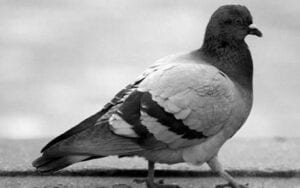
“In fact, in many countries such as England and Wales, Canada, Australia and New Zealand, Campylobacter jejuni infection causes more cases of acute diarrhea than infection by salmonella species,” he wrote.
Like other bugs, salmonella bacteria can cause fever, diarrhea, nausea and vomiting in those infected with it.
The scientists said that although the birds themselves did not seem to get sick from the bacteria, they could potentially pass them on the humans.
“These data should be taken into account for pigeon population management,” they wrote.
Source
Pigeon Patrol Products & Services is the leading manufacturer and distributor of bird deterrent (control) products in Canada. Pigeon Patrol products have solved pest bird problems in industrial, commercial, and residential settings since 2000, by using safe and humane bird deterrents with only bird and animal friendly solutions. At Pigeon Patrol, we manufacture and offer a variety of bird deterrents, ranging from Ultra-flex Bird Spikes with UV protection, Bird Netting, 4-S Bird Gel and the best Ultrasonic and audible sound devices on the market today.
Voted Best Canadian wholesaler for Bird Deterrent products ten years in a row.
Contact us at 1- 877– 4– NO-BIRD, (604) 585-9279 or visit our website at www.pigeonpatrol.ca
Pigeon/Pigeon Patrol / Pigeons Roosting / Vancouver Pigeon Control /Bird Spikes / Bird Control / Bird Deterrent / Pigeon Deterrent? Surrey Pigeon Control / Pest /Seagull deterrent / Vancouver Pigeon Blog / Birds Inside Home / Pigeons in the cities / Ice Pigeons/ What to do about pigeons/ sparrows , Damage by Sparrows, How To Keep Raccoons Away, Why Are Raccoons Considered Pests/ De-fence / Pigeon Nesting/ Bird Droppings / Pigeon Dropping/ woodpecker control/ Professional Bird Control Company/ Keep The Birds Away/ Birds/rats/ seagull/pigeon/woodpecker/ dove/sparrow/pidgeon control/pidgeon problem/ pidgeon control/flying rats/ pigeon Problems/ bird netting/bird gel/bird spray/bird nails/ bird guard
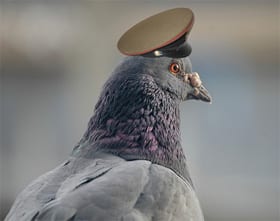
by Pigeon Patrol | Jan 25, 2022 | Bird Spike, Pigeon Spikes, Pigeons, Pigeons in the News, Raccoons, Sparrows, UltraSonic Bird Control
A freewheeling flock of birds is one of nature’s most endearing spectacles. The flock’s members move with uncanny coordination, changing direction in unison, splitting and reforming, and even landing as one. The intricacies of these synchronised flights are very difficult to entangle. Who is following whom? Is there even a leader and, if so, does the same bird always take up pole position? Our feeble eyes could never hope to discern the answers just by watching a flying flock. But fortunately, we have technology that can do the job for us.
, Budapest, has found that flying pigeons obey strict chains of command, even when in flight. He used state-of-the-art GPS devices to track the movements of groups of ten pigeons with exquisite sensitivity. The lightweight monitors, just 16g in weight, captured the subtleties of the pigeons’ twists and turns in mere fractions of a second. Back on the ground, Nagy analysed their recordings to show that pigeons fly according to the pecking orders they establish on the ground. The dominant bird takes the lead and the others follow his directions. Studying the collective movements of animal groups has been a difficult challenge. Many cameras can be used to film animals moving within the same block of space, but the jostling bodies often block one another from view. Mathematical models can tell us about the basic rules that groups of moving animals adhere to, but they are difficult to test in real life. But our technology has now become advanced enough to start skirting around these problems. For scientists studying birds, the key breakthrough was the creation of sensors that are light enough to be strapped to a flying bird without compromising its aerial abilities. Now, these sensors include GPS devices that can record a bird’s speed and direction every fifth of a second. Nagy attached such devices to 13 homing pigeons and watched as they flew in flocks of 7 to 11 birds.

Nagy catalogued every instance when one pigeon changed direction only to be followed by another. By pooling together this data, he created a network of leaders and followers, showing the relationship of each bird to its peers. This colourful diagram shows one such network. Each circle represents an individual pigeon, the arrows point from a leading bird to one that follows it, and the numbers represent the time delay between the leader’s movements and those of its follower’s. The networks showed that flocking pigeons maintain a dependable hierarchy on the wing. On average, when a leading bird changed direction, its followers would follow suit after around a third of a second. Birds will consistently copy the movements of specific individuals further up the pecking order and, in turn, they are consistently copied by more junior underlings. What makes a leading pigeon? It seems that skill counts for something. Nagy released each of his birds on a solo flight, some distance from home. When they returned, he found that those who arrived home quickest were also most likely to wield leadership authority, although this link between navigation ability and seniority wasn’t quite statistically significant. Indeed, the chains of seniority within pigeon flocks are fairly flexible, changing dynamically from flight to flight. Influential birds tend to remain influential but Tamas Vicsek, who led the study, says, “There are days when the pigeon which takes the role most of the time is less active. Perhaps it did not have a good sleep! During these days some of the birds on lower levels of the hierarchy have their chance to lead.” Nagy’s data also revealed that leaders do indeed take up pole position at the front of the flock. That may seem intuitively obvious to us, but remember that pigeons have a field of vision that extends for almost a full 360 degrees. When you can easily see individuals flying behind you, the leading bird doesn’t necessarily need to be at the front, and yet it does. More surprisingly, leaders also tend to stay on the left of the flock. Nagy found that the more time that a bird spent behind a leading partner, the more likely it was to be flying on that partner’s right. There’s an obvious reason for this – like us, pigeons have highly asymmetric brains with each half wielding greater influence over certain thought processes. Their right brain, which receives signals from the left eye, controls the ability to recognise other pigeons. So if a pigeon sees one of its peers through its left eye, rather than its right, it responds more quickly or more strongly.
Source
Pigeon Patrol Products & Services is the leading manufacturer and distributor of bird deterrent (control) products in Canada. Pigeon Patrol products have solved pest bird problems in industrial, commercial, and residential settings since 2000, by using safe and humane bird deterrents with only bird and animal friendly solutions. At Pigeon Patrol, we manufacture and offer a variety of bird deterrents, ranging from Ultra-flex Bird Spikes with UV protection, Bird Netting, 4-S Bird Gel and the best Ultrasonic and audible sound devices on the market today.
Voted Best Canadian wholesaler for Bird Deterrent products ten years in a row.
Contact us at 1- 877– 4– NO-BIRD, (604) 585-9279 or visit our website at www.pigeonpatrol.ca
Pigeon/Pigeon Patrol / Pigeons Roosting / Vancouver Pigeon Control /Bird Spikes / Bird Control / Bird Deterrent / Pigeon Deterrent? Surrey Pigeon Control / Pest /Seagull deterrent / Vancouver Pigeon Blog / Birds Inside Home / Pigeons in the cities / Ice Pigeons/ What to do about pigeons/ sparrows , Damage by Sparrows, How To Keep Raccoons Away, Why Are Raccoons Considered Pests/ De-fence / Pigeon Nesting/ Bird Droppings / Pigeon Dropping/ woodpecker control/ Professional Bird Control Company/ Keep The Birds Away/ Birds/rats/ seagull/pigeon/woodpecker/ dove/sparrow/pidgeon control/pidgeon problem/ pidgeon control/flying rats/ pigeon Problems/ bird netting/bird gel/bird spray/bird nails/ bird guard






 Thomson Reuters, also known as The Answer Company, is the world’s largest provider of news and information to businesses and professionals. As early as the 1850s, they were sending news of bond prices across the English Channel on carrier pigeons.
Thomson Reuters, also known as The Answer Company, is the world’s largest provider of news and information to businesses and professionals. As early as the 1850s, they were sending news of bond prices across the English Channel on carrier pigeons.



